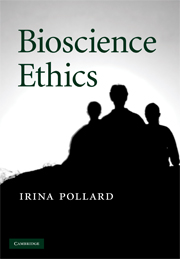Book contents
- Frontmatter
- Contents
- Preface
- Acknowledgements
- 1 Human origins, natural selection and the evolution of ethics
- 2 Sex determination, brain sex and sexual behaviour
- 3 Inappropriate lifestyle and congenital disability in children: basic principles of growth, toxicology, teratogenesis and mutagenesis
- 4 Substance abuse and parenthood: biological mechanisms – bioethical responsibilities
- 5 Fertility awareness: the ovulatory method of birth control, ageing gametes and congenital malformation in children
- 6 Understanding child abuse and its biological consequences
- 7 The state of wellbeing: basic principles, coping strategies and individual mastery
- 8 The state of wellbeing: on the end-of-life care and euthanasia
- 9 Current reproductive technologies: achievements and desired goals
- 10 The recombinant DNA technologies
- 11 Stem cells, nuclear transfer and cloning technology
- 12 Human-dominated ecosystems: re-evaluating environmental priorities
- 13 Human-dominated ecosystems: reclaiming the future for following generations
- 14 Human-dominated ecosystems: warfare = fitness enhancement or losing strategy?
- 15 Human-dominated ecosystems: reworking bioethical frontiers
- Further reading
- Index
1 - Human origins, natural selection and the evolution of ethics
Published online by Cambridge University Press: 17 February 2010
- Frontmatter
- Contents
- Preface
- Acknowledgements
- 1 Human origins, natural selection and the evolution of ethics
- 2 Sex determination, brain sex and sexual behaviour
- 3 Inappropriate lifestyle and congenital disability in children: basic principles of growth, toxicology, teratogenesis and mutagenesis
- 4 Substance abuse and parenthood: biological mechanisms – bioethical responsibilities
- 5 Fertility awareness: the ovulatory method of birth control, ageing gametes and congenital malformation in children
- 6 Understanding child abuse and its biological consequences
- 7 The state of wellbeing: basic principles, coping strategies and individual mastery
- 8 The state of wellbeing: on the end-of-life care and euthanasia
- 9 Current reproductive technologies: achievements and desired goals
- 10 The recombinant DNA technologies
- 11 Stem cells, nuclear transfer and cloning technology
- 12 Human-dominated ecosystems: re-evaluating environmental priorities
- 13 Human-dominated ecosystems: reclaiming the future for following generations
- 14 Human-dominated ecosystems: warfare = fitness enhancement or losing strategy?
- 15 Human-dominated ecosystems: reworking bioethical frontiers
- Further reading
- Index
Summary
Bioethics can serve no useful ends if it is to be merely a watered-down version of contemporary biology … Bioethics must be based on modern concepts of biology and not on unsupported introspection.
Technologies, all byproducts of science, have redefined how we live, work, fight, relax and communicate with one another. They have not only given us knowledge and provided a previously unimaginable technologically based standard of living, but also unprecedented coercive powers. Humans can now choose to command forces in the service of differing social, economic and political goals, and also, predictably, any potential consequences of their choices. Paradoxically, it's not the science but the use or abuse of science's gifts that challenge and demand mature intellectual appraisal. By commanding technological powers way in excess of our Stone Age brain's emotional capabilities to responsibly contain that power, we find ourselves at odds with our evolutionary heritage. We seem uncertain in which direction to head and how to achieve the behavioural goals that provide the adaptability requisite for survival and future wellbeing.
Our predicament may reflect that we are, in essence, essentially the same animal that evolved approximately 30,000–35,000 years ago. Within a comparatively short evolutionary period, we have successfully adjusted from a nomadic lifestyle living in small, closely genetically related groups, to living within settled villages and have weathered, more or less, the stresses of nationally based industrial societies.
- Type
- Chapter
- Information
- Bioscience Ethics , pp. 1 - 23Publisher: Cambridge University PressPrint publication year: 2009



